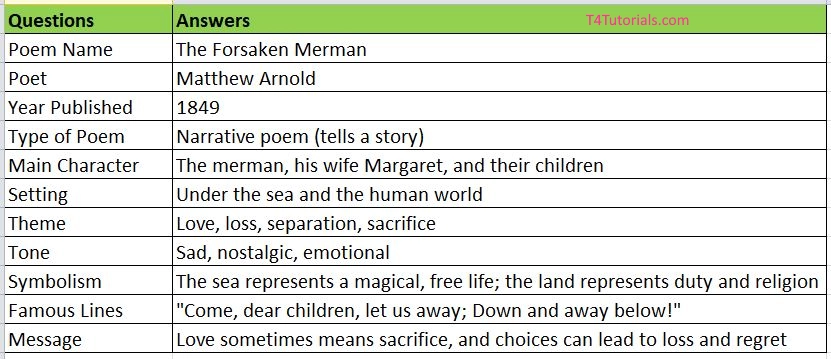The Forsaken Merman is a sad poem about a merman (a sea creature like a male mermaid) who is left heartbroken when his human wife, Margaret, abandons him and their children.
At the beginning of the poem, the merman and Margaret live happily under the sea with their children. Their world is full of beauty, music, and joy. However, one day, Margaret hears the church bells from the land, reminding her of her past human life. She feels guilty about leaving her religion and decides to return to the human world.
The merman waits for her to come back, but she never does. He and his children call out to her, but she ignores them and stays on land. The poem ends with the merman feeling lonely and abandoned, realizing that Margaret has chosen the human world over her family in the sea.
The poem explores themes of love, loss, and the painful choices people make between different worlds.

| Questions | Answers |
| Poem Name | The Forsaken Merman |
| Poet | Matthew Arnold |
| Year Published | 1849 |
| Type of Poem | Narrative poem (tells a story) |
| Main Character | The merman, his wife Margaret, and their children |
| Setting | Under the sea and the human world |
| Theme | Love, loss, separation, sacrifice |
| Tone | Sad, nostalgic, emotional |
| Symbolism | The sea represents a magical, free life; the land represents duty and religion |
| Famous Lines | “Come, dear children, let us away; Down and away below!” |
| Message | Love sometimes means sacrifice, and choices can lead to loss and regret |
MCQs from Some Famous Poems of Matthew Arnold
- MCQs Thyrsis by Matthew Arnold
- MCQs – Dover Beach by Matthew Arnold
- MCQs – The Scholar-Gipsy by Matthew Arnold
- MCQs – Empedocles on Etna by Matthew Arnold
- MCQs – The Forsaken Merman by Matthew Arnold
Summary of Some Famous poems of Matthew Arnold
- Summary – Dover Beach
- Summary – The Scholar-Gipsy
- Summary – Thyrsis
- Summary – Empedocles on Etna
- Summary – The Forsaken Merman
Famous English Authors MCQs
- William Wordsworth MCQs
- William Shakespeare MCQs
- Robert Browning MCQs
- W B Yeats MCQs
- Edmund Spenser MCQs
- Chaucer MCQs
- John Milton MCQs
- S T Coleridge MCQs
- Lord Byron MCQs
- PB Shelley MCQs
- John Dryden MCQs
- John Keats MCQs
- Charles Dicken MCQs
- Alfred Lord Tennyson MCQs
- Charles Lamb MCQs
- D.H Lawrence MCQs
- Thomas Hardy MCQs
- Matthew Arnold MCQs
- John Galsworthy MCQs
- George Bernard Shaw MCQs
- T.S Eliot MCQs
- Ben Jonson MCQs
- Francis Bacon MCQs
- Alexander Pope MCQs
- Oliver Goldsmith MCQs
- Joseph Addison MCQs
- Dr Samuel Johnson MCQs
- Henry Fielding MCQs
- Sir Walter Scott MCQs
- Jane Austen MCQs
- English MCQs Homepage